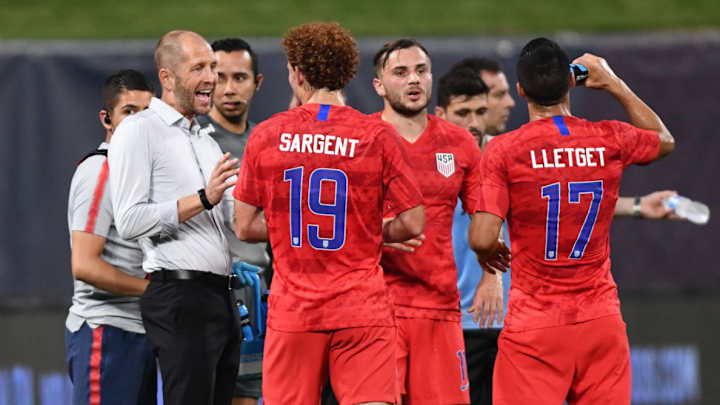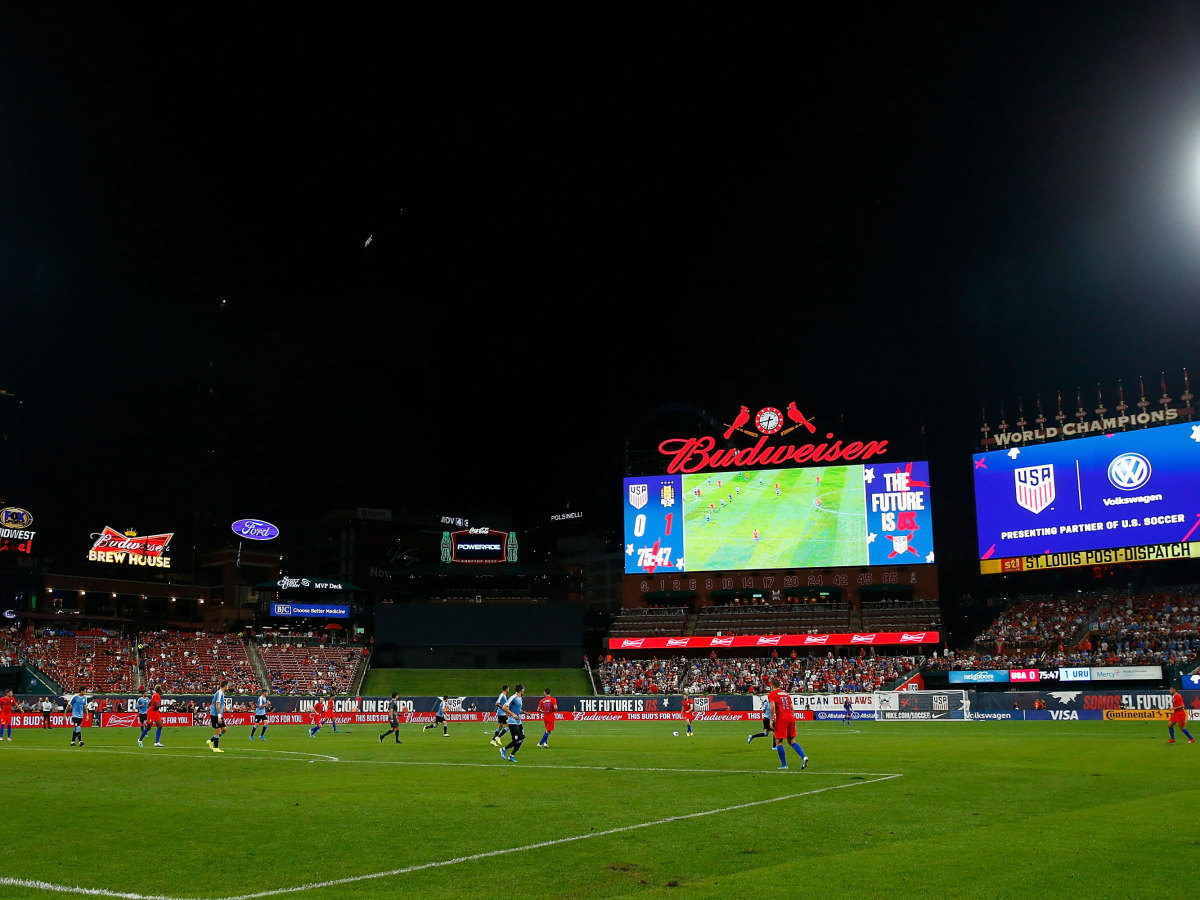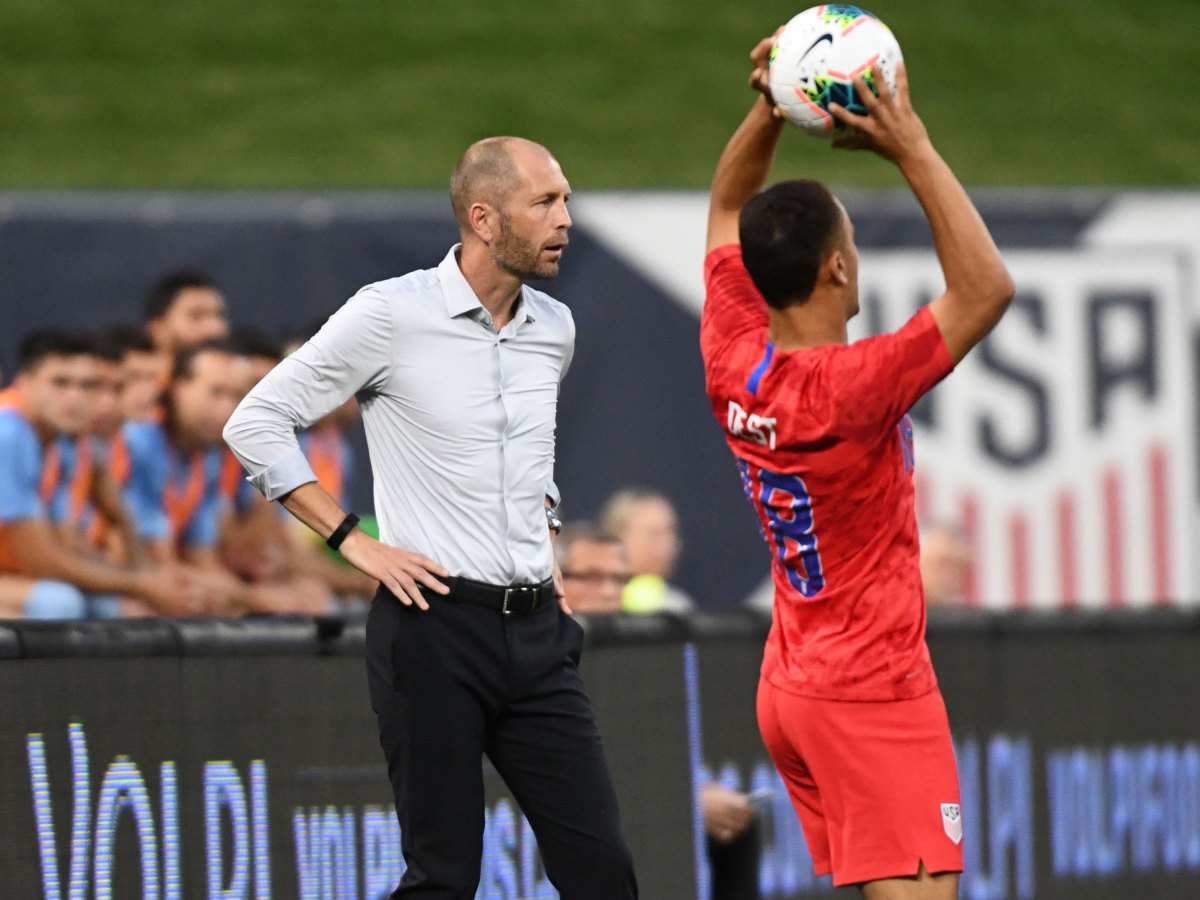For USMNT, Two Very Different Friendlies With One Set of Prevalent Themes

ST. LOUIS — The U.S. national team’s two September friendlies had two notable things in common. There was sod. North Jersey’s MetLife Stadium and St. Louis’s Busch Stadium are nice, but there’s too much artificial turf or dirt, and neither is suitable for soccer without a bit of refurbishment.
There also was the disparity in talent. Mexico and Uruguay were simply better, man for man, than the USA. El Tri brought several big-name players who missed out on the Concacaf Gold Cup triumph to last Friday’s game at the Meadowlands. And Uruguay, although absent the likes of Luis Suárez and Edinson Cavani Tuesday night, still fielded several World Cup quarterfinalists who play for some of Europe’s top teams. The Americans already were without a handful of likely starters through injury or club commitments, then sent Christian Pulisic, Weston McKennie and four others back to their clubs between games. They were undermanned.
Otherwise, the 3-0 loss to Mexico and the 1-1 draw with Uruguay were about as different as two games played in five days can be. That was partly a function of coach Gregg Berhalter’s lineup changes, but more so because El Tri and La Celeste presented such vastly different challenges.
Mexico was fast and frenetic, high pressing the U.S. and then creating danger off turnovers in the American half. Berhalter refused to alter his approach under that onslaught, asking his players to continue to work on passing through the press and to solve the problems presented, rather than alter their focus or improvise. In defeat, there might be some measure of satisfaction in sticking to this young national team’s nascent identity.
Uruguay posed a different sort of challenge, inviting the U.S. into midfield and meeting it with resolute and compact midfield and defensive lines. The Americans would have to marry patience with creativity to bypass that phalanx, all while taking care to avoid getting caught in transition. They managed some of the former and failed once at the latter, leading to the 1-1 result.
Neither game counted. The next four do. In October and November, the USA will meet Canada and Cuba twice each in the inaugural Concacaf Nations League. A spot in next year’s semifinals will be up for grabs. More importantly, the competition doubles as qualifying for the 2021 Concacaf Gold Cup.
Despite the heavy defeat to Mexico, Berhalter insisted this week that victory always matters.
“We are in this to win,” he said. “That’s why you play the game. You want to win the game. There’s no question about it.”
But defeat in friendlies is excusable if the games help establish a winning foundation—if they prove instructive or revelatory, or if there are principles and partnerships that have the chance take root a bit deeper than the sod laid across the Busch Stadium infield. The question then, is what do two completely different matches, played under such different tactical conditions—and with makeshift lineups—say about where Berhalter’s program stands as the Nations League approaches?

For the manager and players, the answer seems to lie in how they met contrasting challenges, how they adjusted with varying personnel and how much they’ve bought in to Berhalter’s plan.
“[These were] two different games but two very important challenges,” Berhalter said after the Uruguay game. “In Concacaf we will play teams that will be very compact. We have to understand how we can break them down. The challenge today was, the mentality of the Uruguayans is very strong. And it was very warm out today. We’re going to play qualifiers where it’s really warm, and having that mental capacity to battle through these things, the relentlessness to keep going, was very important today.
“Against Mexico, it was a totally different challenge,” he continued. “Mexico is a high-pressing, active team in front of a loud crowd, a boisterous crowd, and it presented us with good challenges but also good learning opportunities. And there, we came out of that with a lot to talk about and a lot to learn.”
When you present players with a complex system of play that demands attentiveness, discipline and intelligence, and when you prioritize team culture as much as Berhalter does, you find out sooner or later who’s up to the task. It’ll be revealed in the long run whether Berhalter’s approach is the best solution for this national team. In the meantime, he has to figure out who can handle that approach. Tell the team to play through the Mexican press, and see who maintains his composure or who tries to freelance. Ask them to find a solution to Uruguay’s compressed middle block, and see who makes the right run to open space for a teammate, or who becomes selfish or impatient.
“I'm proud of the guys for working on executing a game plan and [being] really determined to keep opening up and keep trying to play,” Berhalter said Monday about the Mexico game.
Tuesday night, he praised “the tenacity of our guys, the relentlessness of our guys,” as they sought a solution after yielding Uruguay’s goal early in the second half.
In a way, these games were about buy-in. Berhalter will need that to move forward, and both Mexico and Uruguay demanded it.
When asked if the past 10 days helped him narrow down a pool he’s said numbers about 35 players, Berhalter wouldn’t go into specifics. But he did say, “This camp did help us get information.”

One player who did himself a few favors Tuesday night was Jordan Morris. The Seattle Sounders star bundled home the USA’s only goal with his chest, and was active all evening on the left flank, stretching the Uruguayans and providing a valuable and threatening outlet. His perfect 22nd-minute cross to Tyler Boyd should’ve been finished. Morris also played 32 minutes against Mexico.
He called the result Tuesday night, “a testament that there are a lot of good players that people can step in and do a good job.”
Only Reggie Cannon, Aaron Long, Sergiño Dest and Tyler Boyd started both games.
“For us, we’re going to face different teams and different styles of play in qualifying and Nations League and all that kind of stuff. So playing different teams that present different challenges and trying to adapt to those has been important,” Morris said. “I think you saw [against Uruguay] we were able to exploit them with patient play out of the back and switching the field and all the things we’ve been working on. It’s definitely a step forward.”
Long offered a similar perspective.
“Just the bravery to play out of the back,” he said when asked what he took away from the two games. “We played against a very good side in Mexico, and they pressed the whole game and we didn’t waver in our playing out of the back. Obviously it wasn’t perfect, but then to take that into [the Uruguay] game when we could’ve played long and we played [out] again, it felt better.”
The message is getting across. Again, whether it’s the right message remains to be seen. But first, Berhalter has to get everyone on the same page. He spoke about that Monday, perhaps revealing how he’s assessing his team this month, beyond wins or losses.
“I think we’re doing a good job. I think we’ve come a long way,” he said. “I think it’s very clear to the players what we want to do, and now I think it’s just continuing to work on that. When we have conversations with the guys, when we do video sessions with the guys, it’s really impressive how tied in they are to what we’re doing and how informed they are in what we’re doing. The group has been great. I think we’ve come a long way since January. It’s hard to believe that we’ve been working together for nine months, because I think we’ve come a long way.”
